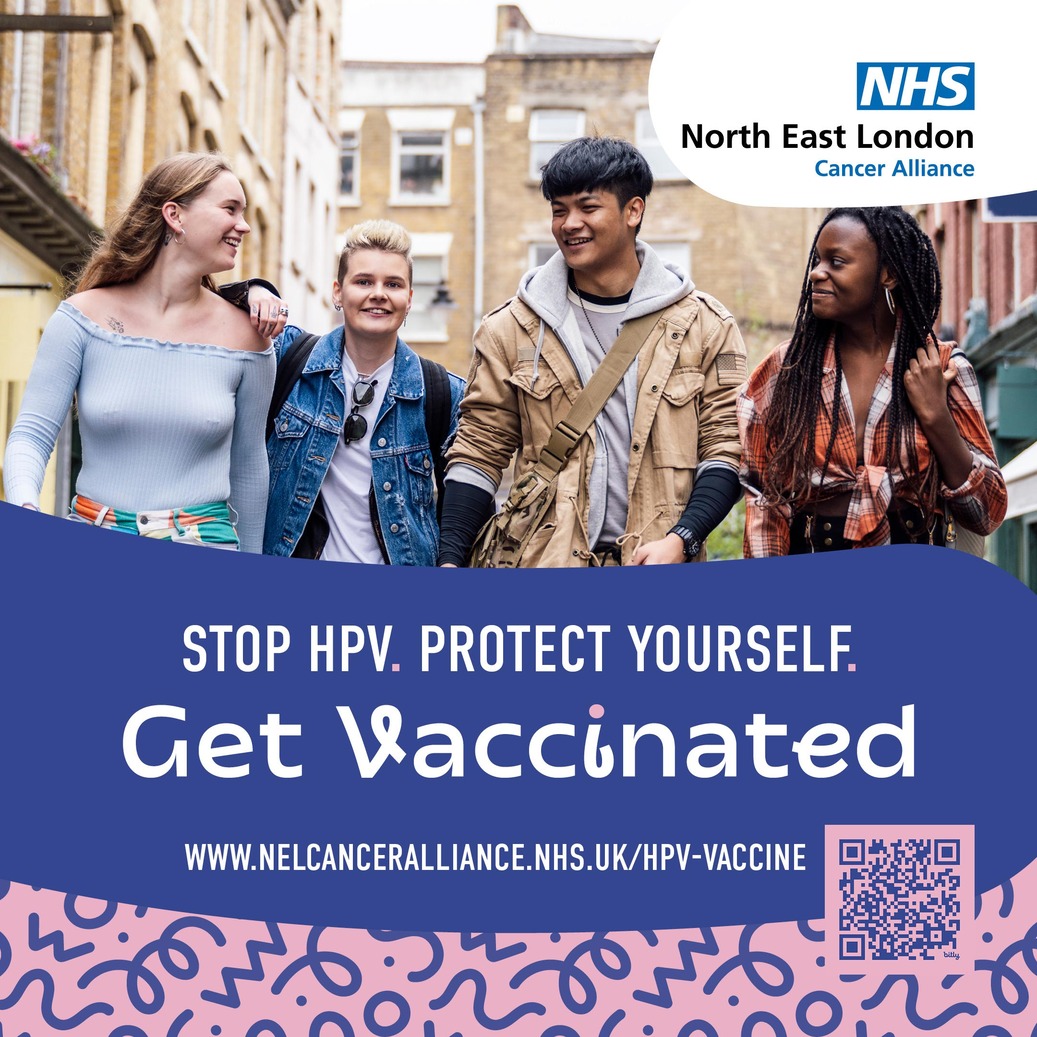Stop HPV. Protect Yourself. Get Vaccinated
What is HPV?
HPV (Human Papillomavirus) is a very common virus. Around 8 in 10 people will come into contact with it at some point in their lives. It spreads through skin to skin sexual contact.
Most of the time, your body clears the virus without any problems. But in some cases, HPV can stay in the body and lead to changes in cells that may develop into cancer.
There are over 200 types of HPV:
- Low risk types can cause warts but don't lead to cancer.
- High risk types can cause several types of cancer.
HPV and cancer
HPV can cause:
- Cervical cancer (nearly all cases)
- Anal cancer (over 90% of cases)
- Vaginal cancer (75% of cases)
- Vulva, Penile, and some head and neck cancers
How is it spread?
- Intimate skin-to-skin contact (vaginal, anal and oral sex).
- HPV can pass even without ejaculation and even when there are no symptoms.
- Condoms and dental dams lower risk but don’t remove it entirely because HPV can affect skin not covered.
How do you protect yourself?
Get the HPV vaccine – It’s safe, effective, and available free from your GP if you're 25 and under. The HPV vaccine protects against the HPV types most likely to cause cancer and genital warts. High vaccine uptake helps protect the whole community. In London, vaccination and screening are part of efforts to eliminate cervical cancer by 2030.
Who gets it?
All children (boys and girls) are offered the HPV vaccine in year 8 (ages 12-13) through the school vaccination programme.
You can also get the vaccine from your GP
- Up to age 25 (if you missed it at school)
- Up to age 45 if you're at higher risk
How does it work?
The vaccine is given as an injection in the upper arm. It helps your immune system produce antibodies that protect you from certain cancer- causing types of HPV
How effective is it?
- In Scotland, Cervical cancer cases have dropped by 90% in women who had the vaccine.
- In England, there were 17,200 fewer cases of serious cervical cell changes (CIN3) in vaccinated women in their 20s
Are There Side Effects?
Most people experience:
- A sore arm for a day or two
- Mild fever or headache
- Feeling a bit tired
Serious side effects?
Serious allergic reactions are incredibly rare - only about 2 people per million doses. But if you’re worried, ask your GP.
Key facts about the HPV Vaccine
Purpose: protect against HPV types that cause cervical and other Cancers.
Best time to get it: Before being exposed to HPV, Usually at ages 12-13
Impact: Greatly reduces HPV infections and Cervical cancer rates
Limitations: Doesn't protect against all types of HPV, so Cervical screening is still important.
Why should you care?
The HPV vaccine is helping us eliminate cervical cancer in London by 2030 - a historic first. By getting vaccinated, you’re protecting yourself, helping stop HPV-related cancers, and being part of something incredible.
Want to Know More?
Visit the NHS website which has further information on HPV Vaccines https://www.nhs.uk/vaccinations/hpv-vaccine/
Talk to your GP – You may still be eligible. If you're 16–25 and missed it at school, it’s not too late!
Link to our Leaflet can be found here
Take Action Today!
- Book an appointment with your GP
- Ask about the HPV vaccine
- Protect yourself and others
FAQs
Do condoms protect against HPV?
They reduce risk but don’t fully protect because HPV can affect skin not covered by a condom or dental dam.
Can I get the vaccine if I’m already sexually active?
Yes. You may still be protected against HPV types you haven’t yet encountered.
Can I get the HPV vaccine if I currently have an HPV infection?
Yes. The vaccine will not cure an existing infection, but it can still protect you from other HPV types you haven’t been exposed to, and may reduce the chance of getting infected again in the future. Although vaccination is most effective before sexual activity begins, it’s still recommended for people in the eligible age groups who have already had HPV, because it offers ongoing protection against high-risk types. Speak to your GP or clinic about the best timing for you.
Is the HPV vaccine safe?
Yes. Most side effects are mild and pass quickly.
What if I’m pregnant or breastfeeding?
The HPV vaccine isn’t routinely given during pregnancy. If you’re pregnant, wait until after. If you’re breastfeeding, your clinician can advise on timing.
What if I have a long-term condition or a weakened immune system?
You may need more than one dose. Your GP or specialist team will advise the best schedule.
I missed my appointment, what now?
Rebook as soon as you can. If you’re 16–25 and missed it at school, catch-up services are available.
